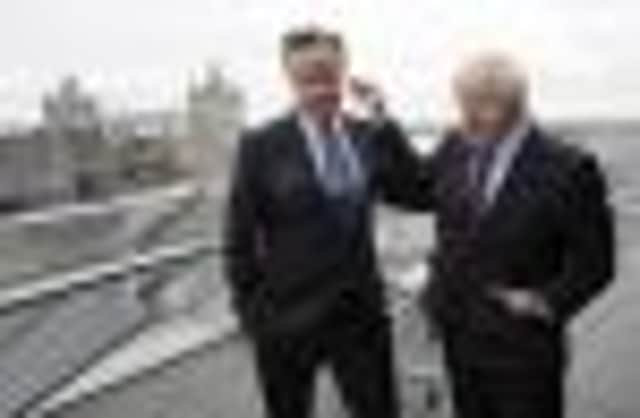Local elections: Cameron and Clegg in joint fightback


Tensions are mounting both in Scotland and England as the Conservatives and Liberal Democrats come under attack from their own ranks over the growing public disenchantment with the UK Government.
Prime Minister David Cameron and deputy Nick Clegg are expected to carry out a joint appearance in the coming days as the two-year anniversary of the formation of the coalition approaches.
Advertisement
Hide AdAdvertisement
Hide AdThey will use this to attempt to drive home the message that the Government is focusing on “jobs, growth and the economy”, and restate the basic principles underpinning why the two parties joined forces. Reports last night suggested Cameron is ready to delay the implementation of gay marriage and House of Lords reform in an effort to appease angry Conservative backbenchers.
Meanwhile, Chancellor George Osborne has been put forward as the Tory “big beast” to face broadcasters today and defend the party in the wake of its election drubbing.
Labour exceeded expectations in England, Scotland and Wales, by gaining 824 seats and winning control over an additional 32 authorities, while 403 Tories and 330 Liberal Democrats fell victim to a cull of coalition councillors.
Yesterday, Cameron attempted to shift the focus on to Boris Johnson’s victory at London’s City Hall, which saw him returned as mayor with 1,054,811 votes to Ken Livingstone’s 992,273. Expressing his “delight” over the re-election of his colleague, and some say future rival for his job, Cameron vowed the pair would “work together” for the good of London.
The Queen’s speech on Wednesday will set out the Government’s agenda for the coming year, which ministers hope will revive its fortunes with a range of measures to placate back-benchers.
But despite success in London, Cameron will find it difficult to shake off criticism following demands from a string of Tory right-wingers, who want him to rein in his coalition partners, re-focus on Conservative priorities and drop “barmy” proposals on gay marriage and reform of the House of Lords. Former Minister Tim Yeo said: “Voters are getting impatient and we need to talk about issues that matter to them. Top of the list that doesn’t matter is House of Lords reform. I would like the Prime Minister to be able to say to Nick Clegg: ‘I’m very sorry, mate, but we’ll put this one a bit further down the agenda for now.’ For Lords reform to be top of the list in the Queen’s Speech, most voters will think he has gone bonkers.”
In Scotland, Tory figures said the slump in their support was further evidence of the “drip-drip” of declining support for Conservativism.
Meanwhile, Lib Dems, who saw their own number of councillors decline, said they were still being punished for the Coalition pact. In Scotland yesterday, where new leader Ruth Davidson was fighting her first election at the helm, the Tories also suffered losses, although party sources insisted last night they had “dodged a bullet” by not losing by an even bigger margin, as happened elsewhere in the UK.
Advertisement
Hide AdAdvertisement
Hide AdHowever, one Tory figure said: “It is another example of loss of vote share. Where will it end? The reality is that there is a constant drip-drip effect of declining support.”
Clegg is facing his own internal party battle as heavy losses sparked furious criticism. The Scottish Lib Dems were seeking to put a brave face on their own losses, insisting that there were signs of life in parts of Scotland such as the Highlands. They said the party’s dreadful performance in Edinburgh was a result of public anger over the trams debacle.
Former Edinburgh councillor Phil Wheeler said: “People just don’t trust the Coalition. It has come at a price, certainly in Scotland.”